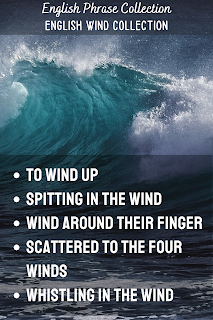Whistling in the wind: Understanding the Origins and Meanings of Common Wind Idioms
Wind is a powerful force of nature that has captured the imagination of people for centuries. In the English language, wind is used metaphorically to express a range of ideas and emotions, from frustration to manipulation. In this post, we will explore the meanings and origins of five popular wind idioms in English.
To wind up
When we say someone is "wound up," we mean they are agitated, anxious, or tense. This expression comes from the winding of a clock or watch, where the tension in the spring builds up until it is released. Figuratively, it suggests that someone is building up to a moment of release, whether positive or negative.
Spitting in the wind
This expression means to waste your time or effort doing something that is futile or pointless. The origin of this idiom is not clear, but it may come from the idea of spitting into the wind, which is not only unproductive but also unpleasant. Figuratively, it suggests that the speaker is warning against pursuing a hopeless or unwise course of action.
To wind someone around your finger
This idiom means to manipulate or control someone easily. The image here is that of twisting or wrapping a piece of string or wire around your finger, which can be done effortlessly. Figuratively, it suggests that the person being manipulated is pliant or easily influenced.
Scattered to the four winds
This expression means to be dispersed or scattered in all directions. The idea here is that the wind is carrying something far and wide, making it impossible to gather or collect. Figuratively, it suggests that something has been irretrievably lost or scattered.
Whistling in the wind
This idiom means to express an opinion or idea that no one is listening to or cares about. The image here is that of whistling into the wind, where the sound is quickly dispersed and lost. Figuratively, it suggests that the speaker is wasting their breath on an audience that is indifferent or unreceptive.
In conclusion, wind idioms offer a fascinating insight into the way the English language uses nature to express complex ideas and emotions. By understanding these idioms and their origins, you can enrich your language skills and communicate more effectively in conversation and writing.
If you're interested in learning more about English idioms and expanding your vocabulary, then our YouTube channel "English Phrase Collection" is definitely worth checking out. We have a wide variety of videos on different topics.


No comments:
Post a Comment